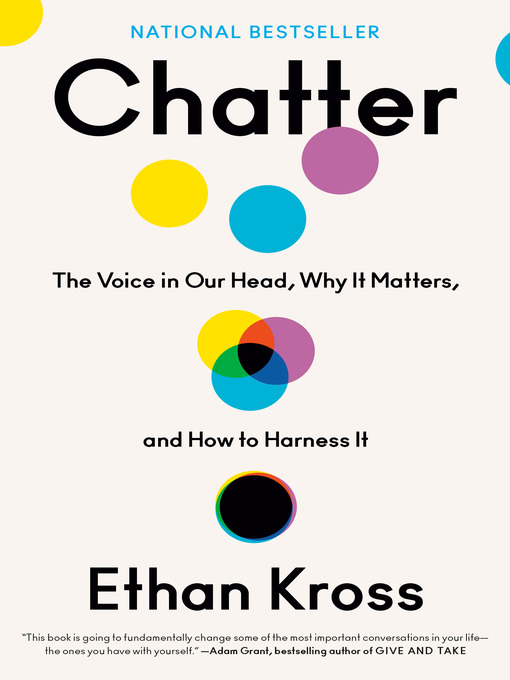
Chatter
The Voice in Our Head, Why It Matters, and How to Harness It
- اطلاعات
- نقد و بررسی
- دیدگاه کاربران
نقد و بررسی

October 15, 2020
We all have a dialogue running continuously through our minds. Sometimes it helps us reason out our problems and find solutions; other times, it short circuits our thought processes. Kross, an experimental psychologist at the University of Michigan, sifts through psychological experiments, studies, and personal experiences to explain the science behind our inner chatter and how to tame it. One way is to look at problems from a distance, creating the difference between trying to solve your own problems and offering advice to a friend. Techniques like journaling, imagining the future, and calling yourself by name or even you can help. Talking to others can make things easier as long as you don't dwell on events, and even a ritual or lucky charm can provide a useful diversion. Kross observes, too, that ordering your surroundings, stepping out into nature, and looking at a photograph of a loved one can break the chatter cycle. Kross recaps his concrete tips in a tools section that will reinforce his sound advice, making this a practical, useful guide to quieting one's inner noise.(Reprinted with permission of Booklist, copyright 2020, American Library Association.)

Starred review from November 2, 2020
Kross, the director of the University of Michigan’s Emotion & Self Control Laboratory, debuts with an eye-opening look at managing “the silent conversations people have with themselves.” He begins with an anecdote from 2011: after Kross received a threatening letter, he spent sleepless nights armed with a baseball bat to protect his family and irrationally blamed himself for causing the situation. Kross eventually calmed down, but his experience inspired the writing of this book in order to share his findings on how to “keep silent, internal conversations from harming mental health.” Using other anecdotes, such as that of Rick Ankiel, whose pitching career with the St. Louis Cardinals was derailed by overwhelming anxiety, Kross walks readers through a wide variety of internal conversations, such as helpful “linked” thought patterns that focus on a goal versus “unlinked” negative thought spirals. Kross profiles LeBron James, Fred Rogers, and Malala Yousafzai, among others, and articulates their strategies for dealing with negative self-talk, such as using rituals (like mantras or daily moments of reflection) to reduce harmful mental chatter. Kross also provides mind-calming tips, such as imagining one’s self-talk as advising a friend and reframing one’s experience as a challenge. Readers dealing with issues of self-talk would do well to pick up Kross’s stimulating foray into popular psychology.

November 1, 2020
A professor of psychology examines the most crucial conversation: with ourselves. In this deft debut, Kross, director of the University of Michigan's Emotion & Self Control Laboratory, helps readers better understand what it means to be human. We all talk to ourselves every day, and even the calmest characters among us do so at a blistering pace. What experimental psychologists and neuroscientists refers to as "chatter" is the part of this one-person t�te-�-t�te that falls into a pattern of thinking, common to the human condition, in which reflection becomes a burden. Since we aren't going to stop talking to ourselves--and, frankly, we don't want to; the voices in our heads have valuable things to say--it's important we use our introspection effectively: "Chatter underlies a variety of mental illnesses," notes the author, who artfully describes how we talk to ourselves, why those conversations are helpful, and the triggers that can get us into trouble. He shows readers meaningful ways to reframe the discussion, when to seek assistance, and how to better support friends and family. The potential of a mind constructively channeled is no small thing, but it's not all about being perpetually present. "The power of the mind to heal itself is, indeed, magical (in the awe-inspiring, not supernatural, sense)." Even if you have all the tools, which the author provides, "it's critical that you build your own toolbox." Throughout this fascinating narrative, fluidly written and packed with insight, Kross is consistently concise, practical, and well organized. Although an academic with impressive credentials, the author speaks to all students of life, grounding the text with illuminating vignettes pulled from the lives of public figures as well as his own. In the end, he shows us how we might have better chats with ourselves, ones that make us happier, healthier, and more productive people. A book that will truly change minds.
COPYRIGHT(2020) Kirkus Reviews, ALL RIGHTS RESERVED.

December 1, 2020
The psychological concept of "self-talk" has been formally studied since the mid-20th century, although much more attention has been paid to it, and a number of books published on it, in the last decade. In this debut, psychologist Kross (Emotional & Self Control Lab, Univ. of Michigan) uses numerous examples and research to show that while positive self-talk (great job!") can be good for us, negative self-talk ("chatter") can lead to a frightening, downward spiral that can "harm our bodies, damage our social lives, and derail our careers." He then provides practical and relatively simple tools a person can implement to "harness the voice in our head," including using distanced self-talk, imagining advising a friend, broadening our perspective, reframing our experience as a challenge, and writing expressively. Helpfully, Kross also includes tools for providing and receiving chatter support, and tools that involve the environment (creating order in one's environment, increasing exposure to green spaces, and seeking out awe-inspiring experiences). His accessible writing will draw in casual readers of psychology and self-help books, and experts seeking to learn how to channel their inner thoughts. VERDICT A well-reasoned, well-researched guide for those prone to negative self-talk and those who support them.--Marcia G. Welsh, formerly with Dartmouth Coll. Lib., Hanover, NH
Copyright 2020 Library Journal, LLC Used with permission.




دیدگاه کاربران